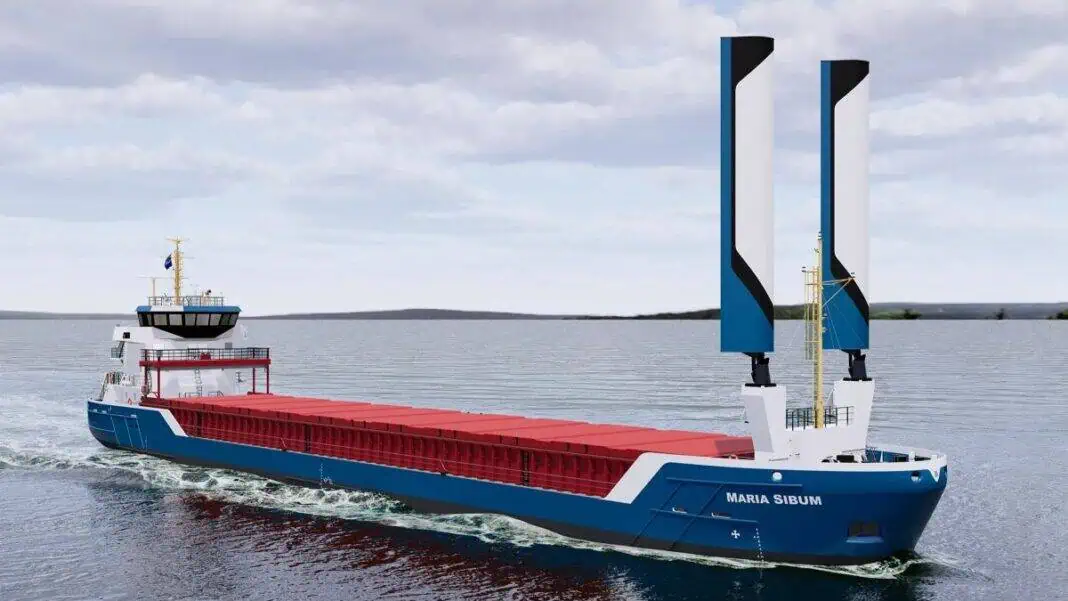Reederei Bernd Sibum, a family-owned German shipping company, has been awarded funding under the NaMKü program (Nachhaltige Modernisierung von Küstenschiffen/sustainable modernisation of coastal ships) by the German Federal Ministry of Digital Affairs and Transport (BMDV). This grant requires co-investment and enables the company to upgrade four Damen Combi Freighters 3850 vessels, currently under construction at Damen Yichang Shipyard, China, with advanced green technologies.
Reederei Sibum placed the order for the four vessels in 2024. The CF 3850 is a next generation design offering a considerable boost in efficiency, with a 30% reduction in fuel consumption.
The vessels, currently under construction at Damen Yichang Shipyard in China, were being built with the capability to sail 100% on biofuel, as well as with batteries for peak shaving and port operations. They were also being prepared hybrid ready.
Now, thanks to the NaMKü award, the vessels are being upgraded to sail on hybrid propulsion, with a PTO/PTI system. This upgrade provides the option of fully electric propulsion. This is not only an environmentally friendly technology, but also a huge safety aspect, as it provides the ships with redundancy for the diesel propulsion engine.
Damen’s modular construction approach allows for its vessels to be built ready for rapid upgrade at any stage of construction, or later as a retrofit project, with the minimum of downtime.
Another upgrade that the vessels will now receive is the installation of Econowind VentoFoils. This wind assisted ship propulsion solution is operated fully automatically to the prevailing wind conditions using intelligent technology. This system is expected to lower the vessels’ fuel consumption in the region of 12.5% over the year, facilitating a significant reduction in emissions.
The vessels will use their batteries while manoeuvring and for a short-term port stay. If the time in port is longer, they can switch from battery operation to shore power. The upgrade with extended shore power capacity will provide all electric systems on board with sufficient electric capacity.
Other features enabled by the NaMKü funding include installation of a heat recovery system, using heat from auxiliary engines that would otherwise be wasted, thereby eliminating gasoil consumption of the oil fired boiler while the vessel is in port.
With all these modifications, the Damen Combi Freighters will be able to operate completely emissions free in harbour.
Reederei Sibum Managing Director Bernd Sibum says, “I’m very grateful to the German Government for the support we have received with this NaMKü award, which has made it possible for us to invest in these green technologies. I’m also grateful to Damen for thinking along with us and preparing the vessels in such a way that they could be quickly adapted. I’m confident that these vessels will offer the market the green tools it will require in the years ahead. It is a clear fact that they will have everything that is feasible according to the current state-of-the-art that is also suitable for practical ship operation. I am particularly happy about the fact that I was able to reach company Mare Trust AG from Oldenburg in Germany as a co-investor for this project.”
Commercial Director of Damen Cargo Vessels Remko Bouma adds, “We have designed the latest generation of CF 3850 with the aim of achieving the increased efficiency and reduced environmental impact required of vessel operators today. Reederei Sibum, with the support of the German Government, are thinking beyond the present and preparing their fleet for the future. They are to be praised for their pioneering approach to maritime sustainability. The bold steps they, and other forward thinking vessel operators, are taking are worthy of wider industry recognition. In the coming years, these vessels are going to need increased access to relevant infrastructure, for example, the shore power connectivity required to operate zero emissions in port. Such infrastructure will play a vital role in realising the full potential of the investments that are being made in maritime innovations and pave the way to zero emission operations.”












